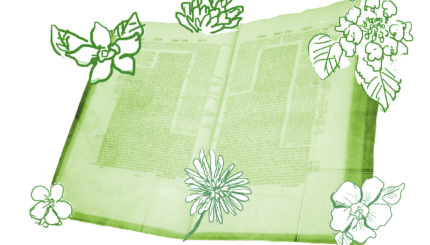Commentary on Parashat Ha'Azinu, Deuteronomy 32:1 - 32:52
Why do people write poetry? With poems, “we get to a truth that is beyond our ability to articulate when we are attempting to ‘use’ language to convey our ideas or stories,” writes poet/editor Matthew Zapruder.
Perhaps this is why Moses switches to poetry after 31 chapters of prose in Deuteronomy.
Up until Parashat Ha’Azinu, Deuteronomy consists mostly of Moses’ valedictory exhortations of the people Israel before they enter the land of Israel. Moses reviews history, restates law and warns about the future. But then, poetry erupts in Deuteronomy 32 and lasts for much of the chapter. Why?
After a lifetime of leading and governing in prose, maybe Moses longs to “campaign” in poetry. Perhaps even the miraculously multivalent biblical text reaches a limit to what it can express. To reach a deeper “truthiness,” to go further and deeper, requires poetry. How does poetry reach that deeper level? I’m not much of a poet, myself. I can’t ever remember choosing, on my own to write poetry. But in the moments when the “assignment” is to write a poem, it is the multiple meanings possible and implicit in a word or a phrase that for me makes the experience of writing poetry more expressive and satisfying than that of writing prose.
Poetry can also be a safer way of expressing ourselves. It’s a kind of code, written with (at least) one meaning, but with no magic decoder ring. Poetry can contain and sustain greater truth than prose, but it does that oftentimes at the cost of clarity, almost by definition. Truth is rarely univocal, but rather is complex and obscure, like poetry.
Thus poetry, by being often less direct and expository, and more veiled and ambiguous can be a gentler way of conveying and hearing upsetting things.
And the message contained in this section’s poetry is not celebratory, unlike Moses’ other main poetic effort, the Song at the Sea in Exodus 15. Rather, it’s critical and bitter, mournful and resigned, recounting God’s redemption of Israel and Israel’s corresponding unfaithfulness. Punishments, past and future, are enumerated. But it ends on a note of hope: Eventually God will take vengeance on Israel’s enemies and vindicate Israel.
Maybe Moses preferred to use the “difficulty” of poetry to obscure and soften the harsh message he was to deliver. This would make it easier to deliver, and easier to hear, so that it would “distill as the dew, like showers on young growth” (Deut. 32:2).
Alternatively, the decision to switch to poetry may not have been about Moses’ needs, but rather about the needs of his audience, whether for that moment or for the future.
Imagine Moses standing, addressing the Israelites. Like any good speaker or teacher, he knows his audience, and reads and reacts to it. To recapture the Israelites’ wandering attention, maybe Moses realizes that he must change his pace and style.
Moses also wants his message remembered long after he is, as he puts it “gathered to his ancestors.” How many long pieces of prose can you recite by memory? I know none. I do, however, know a few poems and many song lyrics, which are of course just poems put to music. Poetry can convey information in a particularly dense, concise and memorable way, preserving information for the ages. Moreover, in an ancient context, when written materials were few and precious and literacy uncertain, a text that was easily memorized, recited and repeated was more likely to survive and to be widely known.
Let’s take a step back now. Thus far, we’ve been engaged in an exercise of using Moses’ switch from prose to poetry to gain insight and understanding into Moses’ possible feelings and motivations. But it may not have been Moses at all who wrote this poem. Perhaps it was God, who according to some strands of Jewish tradition, dictated even Deuteronomy, Moses’ own words, to Moses. Modern biblical scholars see Deuteronomy 32 as a more ancient poem placed into this context by the biblical redactors and editors. Regardless though, someone recognized the need at this moment not for more prose, but for poetry.
Why do we, today, need poetry when we read this section of Torah? Deuteronomy 32 is read in synagogue on the Shabbat either right before or after Yom Kippur. Many Jews by now in the Jewish holiday season have been inundated with all kinds of words, whether from the mahzor (the High Holiday prayer book), from sermons, or from the words of all the people sitting next to and around them. The relative brevity of this Torah portion is itself as refreshing to us as it must have been when it was read in the same season in medieval times.
“Poetry seemed to be about something else, something like creating a different sort of mood, or mental space, or way of thinking,” recognizes Zapruder. Or, in my own attempt at poetry:
When our sentences are running on too long,
Consider whether a verse might belong.
Mahzor
Pronounced: MAKH-zore, Origin: Hebrew, literally “cycle” the mahzor is the special prayer book for the High Holidays, containing all the liturgy for Rosh Hashanah and Yom Kippur.




